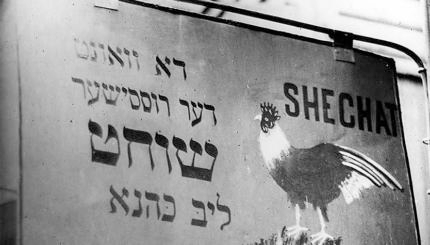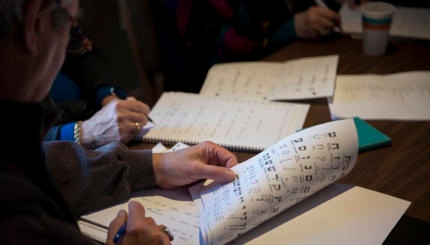Shlep, tuches and oy vey are just a few of the many Yiddish words that have been incorporated into everyday American speech…so much so that their Yiddish flavor has faded a bit. Liven up your vocabulary with these 10 less familiar Yiddish terms. Fil shpass! (Have fun!)
דרעמל
Dreml (DREH-ml): Nap (noun)
Sample Sentence: “Classes today have worn me out — I need to cop a dreml before I do any homework.”
With your help, My Jewish Learning can provide endless opportunities for learning, connection and discovery.
אונטערזאכן
Unterzakhn. (OON-ter-zakhn) Literally “under-things,” unterzakhn refers to undergarments. Unterzakhn is also the title of a graphic novel by Leela Corman.
“Pull up your britches; your unterzakhn are showing!”
קאשע-בולבע
Kashe-Bulbe (KAH-sheh BOOL-beh): Want to expand your culinary Yiddish beyond kreplach and kugel? Kashe-Bulbe means mashed potatoes, and is more fun to say than its English equivalent.
“My mom must put a pound of butter in her kashe-bulbe, but it’s so good I don’t care!”
מלאכה
Malokhe (mah-LOH-kheh): This is a word borrowed from Hebrew, and it means work.
“Just one more hour of this malokhe and I get to head home!”
ניט אזוי איי-איי-איי
Nit azoy ay-ay-ay (NEET ah-ZOY aye-aye-aye; the “ay” should be pronounced like the pronoun “I”): This phrase means ‘”not that great.”
“The band usually puts on a great performance, but last night’s show was nit azoy ay-ay-ay.”
רינגלהעפט
Ringlheft (RIN-gul-heft) This is hands-down my favorite word in Yiddish. It refers to a three-ring binder and is definitely an attention-grabber.
“I often find myself wishing I still had my old Trapper Keeper ringlheft.”
ווערען זאל פון דיר א בלינצע
Veren zol fun dir a blintsa (VEHR-en zol fun DEER ah BLIN-tseh): Yelling this at someone who cuts you off is more entertaining than using more off-color language since you’re telling the offender that they should turn into a blintz!
It’s already a sentence; use it when your buttons have been pushed too far. Make sure to put some attitude behind it! (Some self-righteous fist-shaking, perhaps?)
זיסעלע
Zissele (ZISS-uh-leh) Use this term of endearment instead of the blander ‘”sweetie,” “sugar” or similar English words.
“Would you like the last cheese blintz, Zissele?”
שטוב-מענטש
Shtub-mensch (SHTOOB-mensh, with the “oo” pronounced as in “book”): The literal translation of shtub-mensch is room- or house-person, but is used to mean roommate. English already uses “mensch” to describe a good, decent person., so why not give it an upgrade?
“Even though he’s kind of cheap, my shtub-mensch is a real mensch.”
שושקע
Shushkeh (SHOOSH-keh, with the “oo” pronounced as in “book”): This Yiddish word for “whisper” literally sounds like what it means.
“The museum was so quiet, you could easily hear the slightest shushkeh from two rooms away.”
kreplach
Pronounced: KREP-lakh, Origin: Yiddish, small dumplings, often filled with meat and served in soup.
kugel
Prounounced: KOO-gull (oo as in book), Origin: Yiddish, traditional Ashkenazi casserole frequently made with egg noodles or potatoes.


